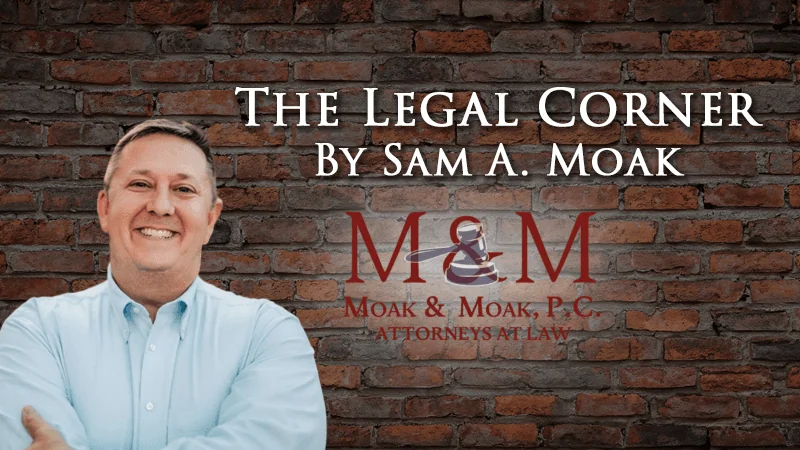The information in this column is not intended as legal advice but to provide a general understanding of the law. Any readers with a legal problem, including those whose questions are addressed here, should consult an attorney for advice on their particular circumstances.
The Fifth Amendment states, “nor shall private property be taken for public use without just compensation.” My initial, inexperienced impression was that this clause meant just what it said. And over the years, my conviction has not changed that this straightforward language indeed indicates an unequivocal truth—that the Constitution prohibits takings for private use. I have written about large power lines and pipelines coming through Walker County before and here we are in Walker County with another new project. This time expansion of the airport. Many of you may be concerned, but there is a process to this expansion. Landowners also have certain rights.
Property is obtained for a project like the airport in a similar method to an electric line or pipeline. It could begin with a request to survey an area of your property for a “potential” expansion. Then, typically an offer is made for the purchase of the property from the entity seeking to take the property for the expansion. If the landowner does not think the offer is fair, they have to make a decision. Accept the low offer or deal with the threat of an eminent domain lawsuit.
In one of the most controversial eminent domain decisions ever, the United States Supreme Court ruled in 2005 (Kelo vs. City of New London ) that a city’s exercise of its eminent domain powers to take private property in furtherance of an economic development plan satisfied the constitutional requirement that such power be used only for a “public use,” even though private developers stood to profit handsomely from the city’s actions. In reaction to that ruling, some state legislatures have been busy crafting legislation to limit the use of condemnation powers in such circumstances. For their part, the owners of property targeted for condemnation have considered how they still might fend off the taking, or, failing that, how to maximize the compensation that the government must pay.
In Kelo vs. City of New London, a landowner was not able to defeat a condemnation initiated by a city so that a new hotel could be built on the property, but he did receive maximum compensation from an obviously sympathetic jury. The landowner was an immigrant who had spent two years and a lot of money renovating a warehouse and building a mail-order cigar business. When two private developers were unsuccessful in negotiations to buy the property as a site for a hotel, they instead reached an agreement with the city whereby the city would condemn the property for their desired use and the developers would pay the costs and fees associated with the condemnation.
When the city was first attempting to buy the property, it sent the landowner a toxic waste notice requiring him to investigate whether any toxins existed in the ground. The landowner tried to comply, but after spending many thousands of dollars he found no toxins. The city would later admit in the litigation that such an investigation was not really feasible so long as a building remained on the property. The toxic waste notice, and especially its suspicious timing, came to be seen as a tactic to put pressure on the landowner during the negotiations leading up to the condemnation.
Although the trial court ruled that the city could condemn the land for the hotel, in the subsequent trial before a jury for damages, the landowner fared much better. The jury awarded him the entire amount he had sought. The award included several million dollars each for the value of the property itself and for the loss of the goodwill associated with the cigar business. Damages for loss of a business are not typical in condemnation cases, but the landowner was able to show that there was no suitable alternative location for the business, so that he would have to start over from scratch. For good measure, the jury also awarded damages equal to the cost of the dubious toxicity study that the landowner had been forced to undertake.
As Texas’ population grows, additional property will be necessary to accommodate this growth, i.e., airports, roadways, pipelines, utility lines, etc. Usually the acquisition of this additional property will be through negotiations with the landowner and buyer/developer. While the landowner may believe he is negotiating the price that he will accept, he could quickly find himself boxed into a corner with limited leverage. The party pursuing eminent domain could have their lawsuit filed and a group of hand picked special commissioners, whose duty it is to determine a value for the property, already in place well before the owner is aware of what is happening. This is because the notice requirement in eminent domain lawsuits is much different than the notice requirements in other lawsuits. Additionally, it may not be the local government pursing this action. It could be a development company or the state widening a highway or Farm to Market Road. Their goal is to get the property for the lowest price they can. On the one hand, they are spending taxpayer money, but on the other hand, it is your home or land they are taking.
If you find yourself in the position of having your property taken by a pipeline company, state or local government about an airport or road expansion, then you should immediately consult an attorney who is skilled in eminent domain, real estate transactions and familiar with the local real estate market.
Sam A. Moak is an attorney with the Huntsville law firm of Moak & Moak, P.C. He is licensed to practice in all fields of law by the Supreme Court of Texas, is a Member of the State Bar College, and is a member of the Real Estate, Probate and Trust Law Section of the State Bar of Texas.


